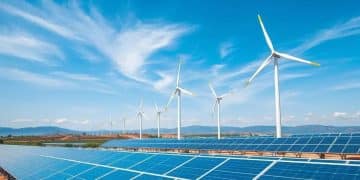Insights on data center efficiency news: what you should know

Optimizing data center efficiency involves regular maintenance, effective energy management, staff training, and automating tasks to enhance performance while reducing costs.
Insights on data center efficiency news show how critical it is for organizations to stay ahead. Are you aware of the latest strategies that can help your facility become more sustainable and cost-effective? This article dives into essential trends and practices.
Understanding data center efficiency trends
Understanding data center efficiency trends is essential for organizations looking to remain competitive in today’s technology-driven world. As energy costs continue to rise, companies are prioritizing sustainability alongside performance. This article highlights the latest trends shaping the efficiency of data centers.
Current Trends in Data Center Efficiency
In recent years, several trends have emerged that significantly impact how data centers operate. With a focus on energy conservation and performance enhancement, these trends include:
- Virtualization: This technology allows multiple virtual machines to run on a single physical server, maximizing resource use.
- Edge Computing: Processing data closer to its source reduces latency and bandwidth use, enhancing overall efficiency.
- Renewable Energy Sources: Many data centers are making the shift to solar or wind energy, which lowers their carbon footprint.
- Advanced Cooling Techniques: Implementing innovative cooling methods helps maintain optimal temperatures while using less energy.
Organizations are increasingly aware of these strategies, working to implement them as part of their operational model. For instance, companies are investing in energy-efficient hardware, which plays a significant role in reducing power consumption.
The Role of Technology in Enhancing Efficiency
Technology continuously propels data center efficiency forward. Automation and artificial intelligence (AI) have become vital in managing workloads effectively. These technologies analyze real-time data to optimize power usage and streamline operations.
Another important aspect is the use of environmental monitoring systems, which provide insights into energy consumption and help identify inefficiencies. By analyzing this data, organizations can make informed decisions about upgrades or changes.
Additionally, the adoption of serverless computing can lead to reduced energy usage, as it enables developers to run applications without managing servers directly.
Investing in innovations not only boosts efficiency but can also lead to operational cost savings in the long run. As technologies evolve, the potential for enhancing data center efficiency keeps expanding, making it a critical focus for future developments.
Technological innovations enhancing efficiency

Technological innovations are at the forefront of enhancing data center efficiency. As the demand for computing power increases, organizations are turning to the latest technologies to optimize performance and reduce energy consumption. This section explores how these innovations contribute to overall efficiency.
Key Innovations in Data Center Technology
Several groundbreaking technologies are now utilized in data centers, resulting in significant efficiency improvements. Among these innovations are:
- Artificial Intelligence: AI helps manage resources efficiently by predicting workload spikes and optimizing energy use.
- Machine Learning: ML algorithms analyze data center operations, identifying areas to streamline processes and enhance efficiency.
- Advanced Cooling Solutions: Technologies like liquid cooling and evaporative cooling are more effective and consume less energy than traditional methods.
- Modular Data Centers: These centers can be quickly deployed and scaled, allowing organizations to meet demand without wasting resources.
With the integration of these technologies, data centers are not only improving their performance but are also reducing costs. For instance, AI-powered systems can adjust cooling based on real-time temperatures, ensuring optimal conditions without unnecessary energy expenditure.
Impact of Automation on Efficiency
Automation plays a crucial role in optimizing data center efficiency. By automating routine tasks, data centers can minimize human errors and increase operational speed. This leads to better resource management and reduced downtime.
Businesses can leverage automation for several functions, including server provisioning, workload balancing, and energy management. Smart systems can detect inefficiencies and adjust processes automatically, resulting in significant improvements.
In addition, automated monitoring systems provide valuable insights that help data center operators make informed decisions about upgrades or changes needed to enhance performance. The blend of automation and intelligence ultimately allows for better scalability and resource allocation.
Case studies of successful data centers
Examining case studies of successful data centers can provide valuable insights into best practices for optimizing efficiency. Learning from organizations that have successfully implemented innovative solutions helps others to make informed decisions.
Case Study 1: Google Data Centers
Google is renowned for its focus on sustainability and efficiency. Their data centers utilize advanced cooling techniques, including using outside air to cool systems when possible. The integration of machine learning allows Google to predict server needs, adjusting resources dynamically.
These measures not only reduce energy consumption significantly but also enhance overall performance. As a result, Google has reported energy efficiency levels that surpass traditional data centers by substantial margins.
Case Study 2: Facebook’s Prineville Facility
Facebook’s Prineville, Oregon data center is another excellent example. This facility uses an innovative cooling system that relies heavily on outside air. By minimizing energy use and optimizing physical space, the Prineville data center has achieved an impressive annual energy efficiency rating.
Facebook’s commitment to renewable energy sources, such as solar and wind power, contributes to its goal of 100% renewable energy in its operations.
Case Study 3: Microsoft Azure
Microsoft Azure has also set a high standard in data center efficiency. They have implemented a strategy of using modular data centers, which are scalable and can be deployed rapidly based on demand. This flexibility is crucial in meeting changing customer needs while maintaining operational efficiency.
Moreover, Microsoft focuses on automating routine tasks, enhancing system management. The use of AI and machine learning create a data-driven approach to predictive analysis for resource allocation.
These successful case studies demonstrate that adopting these innovative strategies can lead to improved data center efficiency. Organizations can learn from these examples and develop their methods to optimize operations and reduce costs.
Best practices for optimizing operations

Implementing best practices for optimizing operations in data centers is crucial for efficiency and sustainability. These practices not only improve performance but also reduce costs, making them essential for any organization.
1. Regular Maintenance and Upgrades
Regular maintenance is important for preventing downtime and ensuring equipment runs smoothly. Organizations should schedule routine checks and upgrades for their hardware, software, and cooling systems. This proactive approach helps identify issues before they become bigger problems.
- Schedule regular inspections: Regularly inspect systems and infrastructure.
- Update software: Keep software up to date to avoid security flaws.
- Replace outdated hardware: Ensure that aging equipment is replaced timely to maintain efficiency.
Failure to maintain equipment can lead to unexpected outages, resulting in higher operational costs and data loss.
2. Energy Management and Monitoring
Effective energy management is vital for optimizing data center operations. Implementing monitoring tools can help track energy consumption and identify areas for improvement. These tools provide valuable insights into how energy is being used.
With this information, organizations can adjust their practices to reduce energy waste, which is often a significant cost in data center operations. Simple changes, like adjusting temperature settings, can have a major impact on overall efficiency.
3. Staff Training and Development
Investing in staff training enhances operational efficiency significantly. Well-trained personnel can operate systems more effectively and respond quickly to issues. Regular training sessions on the latest technologies keep staff updated and engaged.
Creating a culture of continuous learning ensures that employees are aware of best practices and can contribute to the success of optimization efforts. Employees equipped with the right skills play a crucial role in maintaining high operational standards.
4. Automating Repetitive Tasks
Automation can greatly enhance data center efficiency. By automating repetitive tasks such as backups, updates, and monitoring, organizations free up valuable time and resources. This allows staff to focus on more strategic initiatives.
Automation helps in reducing human error and improving accuracy in routine operations. Implementing automation tools helps maintain consistent performance and reliability across the board.
In summary, optimizing data center operations is essential for achieving greater efficiency and sustainability. By adopting best practices such as regular maintenance, energy management, staff training, and automation, organizations can significantly improve their performance. These strategies not only reduce costs but also enhance the reliability and scalability of data centers. Embracing technological innovations will further drive efficiency, allowing businesses to stay competitive in a fast-paced environment.
FAQ – Frequently Asked Questions about Data Center Efficiency
What are the key practices to optimize data center operations?
Key practices include regular maintenance, energy management, staff training, and automating repetitive tasks.
How can energy management tools help my data center?
Energy management tools track consumption and identify areas for improvement, leading to reduced operational costs.
What role does automation play in data centers?
Automation enhances productivity by freeing staff from routine tasks, allowing them to focus on strategic initiatives.
Why is staff training important in a data center?
Well-trained staff can effectively manage systems and respond quickly to issues, improving overall operational efficiency.





